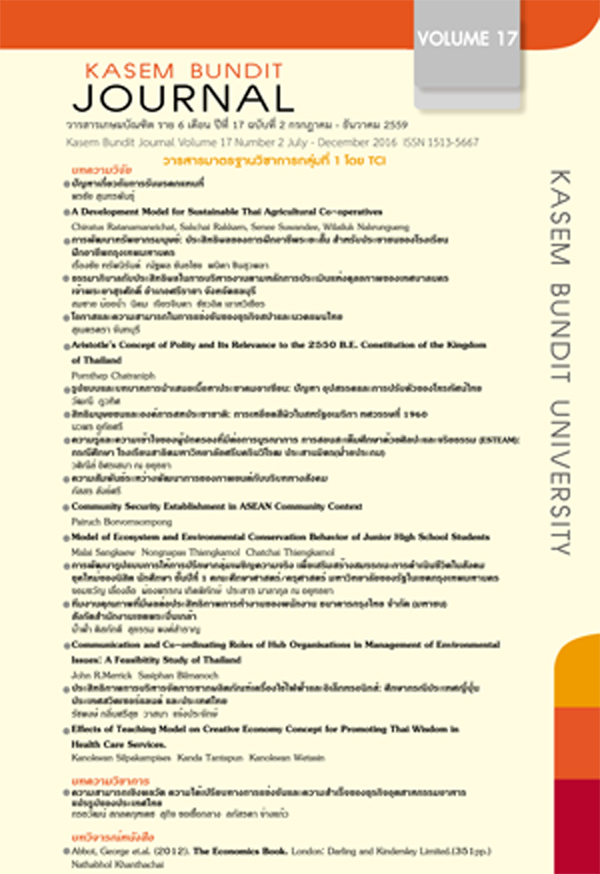สิทธิมนุษยชนและองค์การสหประชาชาติ: การเหยียดสีผิวในสหรัฐอเมริกา ทศวรรษที่ 1960
Keywords:
การเหยียดสีผิว, สิทธิมนุษยชน, Racism, Human RightsAbstract
บทคัดย่อ
การวิจัยนี้มีวัตถุประสงค์เพื่อศึกษาบทบาทขององค์การสหประชาชาติต่อกรณีปัญหาสิทธิมนุษยชนและการแก้ไขปัญหาการเหยียดสีผิวที่เกิดขึ้นในสหรัฐอเมริกา ช่วงทศวรรษที่ 1960 โดยศึกษาจากข้อมูลเอกสารชั้นต้นและเอกสารชั้นรอง ผลการวิจัยพบว่าบทบาทในการเรียกร้องสิทธิมนุษยชนในสหรัฐอเมริกาที่ได้รับผลสำเร็จ มาจากนักเคลื่อนไหวจากองค์กรเพื่อสิทธิมนุษยชนภายในประเทศมากกว่านอกประเทศ และ นอกจากนี้องค์การสหประชาชาติไม่สามารถเข้าทำงานแก้ไขปัญหาได้โดยตรงในสหรัฐอเมริกา จึงเน้นการมีบทบาทต่อปัญหาการเหยียดสีผิว ด้วยการสนับสนุนโดยการให้ความรู้ความเข้าใจแก่องค์กรสิทธิมนุษย์ภายในสหรัฐอเมริกา และมุ่งเน้นไปที่การร่างกฎกติกาและอนุสัญญาที่มีความครอบคลุมถึงเรื่องสิทธิมนุษยชนมากขึ้น เพื่อเป็นข้อตกลงร่วมแก่ประเทศสมาชิก และเพื่อให้เป็นแม่แบบของการจัดทำกฎหมายว่าด้วยสิทธิมนุษยชนในประเทศ แทนการที่องค์การสหประชาชาติจะเข้าไปแก้ไขโดยตรง
Abstract
This research aimed to study the role of the United Nations (UN) in addressing the problem of racial discrimination in the United States of America during the 1960s and to consider the guidelines used by the US government in solving or at least coping with the problem of racial discrimination. The researcher studied secondary data in order to analyze situations and social conditions and the role and participation of the UN in respect to issues of human rights and the problem of racial discrimination in the US during the 1960s. It was, and revealed that the UN’s role in calling for human rights in the US was successful because the UN directly influenced activists from human rights organizations in the country rather than those from outside the country. Although the UN could not directly solve racial discrimination problems in the US, it still was able to play a role in confronting the problem of racial discrimination. It lent support by providing knowledge and understanding to human rights organizations in the US. It also increasingly focused on the drafting of regulations and conventions covering human rights. These were be used as agreements by all member countries and to serve as a model for the makings of human rights laws in member nations, instead of the UN directly tackling the problems.
nd reginal content, rather than emphasizing only on Thailand. Finally and most importantly, it should be careful about information selection for presentation in order to avoid a conflict and dispute of international relationship
Downloads
Published
How to Cite
Issue
Section
License
ทัศนคติ ความคิดเห็นใด ๆ ที่ปรากฏในวารสารเกษมบัณฑิตฉบับนี้เป็นของผู้เขียน โดยเฉพาะ มหาวิทยาลัยเกษมบัณฑิตและบรรณาธิการ ไม่จำเป็นต้องมีความเห็นพ้องด้วย







